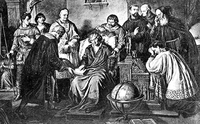
Aleksander Lesser
Encyclopedia
Aleksander Lesser was a Polish
painter
and art critic
of Jewish descent. Lesser specialized in Polish historic and contemporary themes. He was a member of Kraków
’s Academy of Learning
and co-founder of Warsaw
's Zachęta, the Society for Encouragement of the Fine Arts
.

and Munich
. He was a founder of the history-painting movement in Poland, which is considered a part of the "archeological trend" that existed before Jan Matejko
. The trend's purpose was to portray the entire history of Poland in works of art.
Lesser's works were based on serious study of Poland’s past.
His most famous paintings include:
Also notable are:
Poles
thumb|right|180px|The state flag of [[Poland]] as used by Polish government and diplomatic authoritiesThe Polish people, or Poles , are a nation indigenous to Poland. They are united by the Polish language, which belongs to the historical Lechitic subgroup of West Slavic languages of Central Europe...
painter
Painting
Painting is the practice of applying paint, pigment, color or other medium to a surface . The application of the medium is commonly applied to the base with a brush but other objects can be used. In art, the term painting describes both the act and the result of the action. However, painting is...
and art critic
Art critic
An art critic is a person who specializes in evaluating art. Their written critiques, or reviews, are published in newspapers, magazines, books and on web sites...
of Jewish descent. Lesser specialized in Polish historic and contemporary themes. He was a member of Kraków
Kraków
Kraków also Krakow, or Cracow , is the second largest and one of the oldest cities in Poland. Situated on the Vistula River in the Lesser Poland region, the city dates back to the 7th century. Kraków has traditionally been one of the leading centres of Polish academic, cultural, and artistic life...
’s Academy of Learning
Academy of Learning
Academy of Learning was a primary Polish scientific institution during the annexation of Poland founded in 1871 in Kraków and formed as a continuation of the Kraków Scientific Society . The institiution began activity two years later, in 1873...
and co-founder of Warsaw
Warsaw
Warsaw is the capital and largest city of Poland. It is located on the Vistula River, roughly from the Baltic Sea and from the Carpathian Mountains. Its population in 2010 was estimated at 1,716,855 residents with a greater metropolitan area of 2,631,902 residents, making Warsaw the 10th most...
's Zachęta, the Society for Encouragement of the Fine Arts
Zacheta
The Zachęta National Gallery of Art, short Zachęta, , is one of Poland's most notable institutions for contemporary art. Situated in the centre of Warsaw, the main aim of the gallery is to present and support primarily Polish contemporary art and artists...
.

Life
Lesser studied painting at Warsaw University's department of fine arts, as well as at art schools in DresdenDresden
Dresden is the capital city of the Free State of Saxony in Germany. It is situated in a valley on the River Elbe, near the Czech border. The Dresden conurbation is part of the Saxon Triangle metropolitan area....
and Munich
Munich
Munich The city's motto is "" . Before 2006, it was "Weltstadt mit Herz" . Its native name, , is derived from the Old High German Munichen, meaning "by the monks' place". The city's name derives from the monks of the Benedictine order who founded the city; hence the monk depicted on the city's coat...
. He was a founder of the history-painting movement in Poland, which is considered a part of the "archeological trend" that existed before Jan Matejko
Jan Matejko
Jan Matejko was a Polish painter known for paintings of notable historical Polish political and military events. His most famous works include oil on canvas paintings like Battle of Grunwald, paintings of numerous other battles and court scenes, and a gallery of Polish kings...
. The trend's purpose was to portray the entire history of Poland in works of art.
Lesser's works were based on serious study of Poland’s past.
His most famous paintings include:
- The Defense of Trembowla against the Turks (1841)
- The Funeral of the Five Fallen in 1861 (1861), depicting the funeral of PolesPolesthumb|right|180px|The state flag of [[Poland]] as used by Polish government and diplomatic authoritiesThe Polish people, or Poles , are a nation indigenous to Poland. They are united by the Polish language, which belongs to the historical Lechitic subgroup of West Slavic languages of Central Europe...
of CatholicCatholicThe word catholic comes from the Greek phrase , meaning "on the whole," "according to the whole" or "in general", and is a combination of the Greek words meaning "about" and meaning "whole"...
and Hebrew descent who had been murdered by Russian Cossacks. The painting includes Roman Catholic, Eastern Orthodox and Jewish clergymen. - Portraits of Polish Kings – 40 portraits of Polish monarchs. The paintings, together with commentaries, were published in WarsawWarsawWarsaw is the capital and largest city of Poland. It is located on the Vistula River, roughly from the Baltic Sea and from the Carpathian Mountains. Its population in 2010 was estimated at 1,716,855 residents with a greater metropolitan area of 2,631,902 residents, making Warsaw the 10th most...
in 1860.
Also notable are:
- The Recovery of Wanda's Body from the Wisła River
- Kadłubek Writing His Chronicle at a Monastery
- Young Boleslaw Wrymouth Departs Moravia
- The Coronation of Leszek I the WhiteLeszek I the WhiteLeszek I the White , also listed by some sources as Leszek II the White, was Prince of Sandomierz and High Duke of Poland from 1194 until his death, except for the short periods following when he was deposed as Polish ruler...
- The Prussian Tribute
- Copernicus' Last Moments
- Paintings with Christian themes, e.g., The Transfiguration of JesusJesusJesus of Nazareth , commonly referred to as Jesus Christ or simply as Jesus or Christ, is the central figure of Christianity...
; Mary Magdalen.

